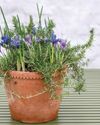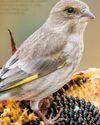
January, for me, always brings a sense of new beginnings, to life and the garden. While we may not be quite at the moment when we get the first inkling of spring-your snowdrops may still be some way off, the nights long and temperatures chilly - but with everything so still, it feels like the big breath in before the season begins to slowly crank up and things get growing again in a month or so.
For now, the garden is quiet and bare. But with nothing stirring there is no particular hurry and we can tackle big jobs in a leisurely way. Renovation pruning is often best done when plants are dormant - in other words, now. We also work our way through big jobs such as pollarding, coppicing and orchard pruning (but not plums or cherries), as well as the smaller cutting back of things like herbaceous perennials that have finally succumbed to cold weather and no longer provide food and shelter for wildlife. January is a fantastic time to get into the back of the beds and prune shrubs without trampling plants, but make sure you do it when the soil is relatively dry, so that it doesn't get compacted.
Controlling older philadelphus
Older philadelphus plants can become congested and gnarly, so go for a hard prune while the shrub is dormant. It will soon re-grow vigorously. Any thicker stems may require a saw rather than secateurs - wear gardening gloves to protect your hands from the sharp blade.
Other plants to prune now
We should expect plenty of frosts to immediately follow the cuts we make now, therefore, this is the time for pruning really hardy plants that need to be tackled when totally dormant.
This story is from the {{IssueName}} edition of {{MagazineName}}.
Start your 7-day Magzter GOLD free trial to access thousands of curated premium stories, and 9,000+ magazines and newspapers.
Already a subscriber ? Sign In
This story is from the {{IssueName}} edition of {{MagazineName}}.
Start your 7-day Magzter GOLD free trial to access thousands of curated premium stories, and 9,000+ magazines and newspapers.
Already a subscriber? Sign In

Tales from Titchmarsh
Tending the land is a rewarding if undervalued career, and it's also the best way to safeguard our future on this planet 'Same old, same old...' is a phrase that sends a shiver down my spine. Friends who have hoed the same furrow (pardon the gardening analogy) year after year in a job that pays the rent but which they do not like have my deepest sympathy.

Container of the month
Mark fresh beginnings with a hit of colour, combining bright evergreens and early risers

Boost your wellness the natural way
Gardening is good for you! Six inspiring experts reveal how getting your hands into soil, growing beneficial plants and connecting with nature can transform all aspects of your health.

Potting on a winter show PART 2
Nick Bailey banishes January blues with a sophisticated container display that's guaranteed to lift the spirits

Winter scents
Fragrant flowers can help lift the spirits on cold winter days. Monty shares his favourite plants to fill the garden with olfactory joy

Growing THE GOOD LIFE
If you've always wanted your own mini farm, let urban smallholder Sara Ward show you how

Arit's 7 deadly sins
Discover Arit Anderson's guilty gardening secrets and how you can turn your own sins into wins

Garden globetrotting
Desert Botanical Garden, Phoenix Garden globetrotting Fancy a new look for your plot or just want to try something different? Our new series about gardens around the world could be just the ticket. This month, Matt Collins reveals what captured his heart in Arizona

10 nature-led ways to feed birds
Want to give wild birds a natural boost this winter? Kate Bradbury explains how to attract a wide diversity of birds to forage within your garden and why this is so beneficial

A new plot for tasty crops
Taking on a new allotment needn't be hard work. By simply following a few easy tips you can have bumper crops in no time, just like Alessandro Vitale